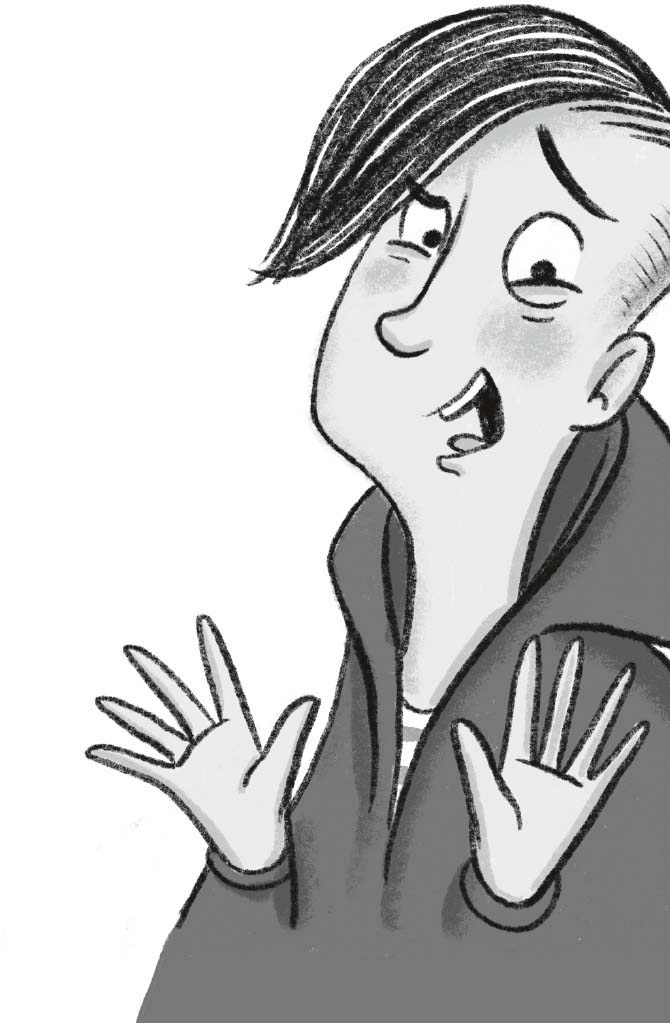“It’s brilliant!” said Amy, going up the ramp into the van a few days later.
“I’m glad you like it,” said Suzi.
“I love it!” said Amy.
“Great. You can write a letter to your dad, thanking him maybe.”
“I already have! I sent him an email telling him how amazing it is. Look!” Amy turned the wheelchair all the way round, inside the van, and came back down the ramp. “It’s like a dodgem car!”
She came off the ramp and turned round again, twisting the control lever on her new, black, shiny and, most importantly, motorised wheelchair.

Her mum had parked the van in their drive and opened the back doors, so that Amy could practise going up and down the ramp. Which she had been doing for a while.
Quite a long while.
“It’s like a dodgem car …” echoed Jack, Amy’s fourteen-year-old brother, who was standing – or at least slouching, his back against the door – in their front garden, pretending not to be interested.
It was one of the things he did all the time now, repeating back anything that anyone said, in a bored, taking-the-mickey voice. Amy sometimes wondered if, when he was about twelve and a half, her brother had been secretly replaced in the night by a sarcastic echo chamber.
“Well, it is, a bit,” said Amy. “Remember when Dad took me on the dodgems, Mum?”
“Of course! He took both of you in one car. You both drove it.”
“Yes, but he let me do the steering wheel by myself after a bit. And I swerved through all the other cars. We didn’t even bump once!”
“Ha. Yes, that’s right! What age were you then?”
“Seven. And then he bought us candyfloss!”
Suzi nodded, and looked down. Amy’s dad, Peter, didn’t live with them any more. He lived a long way away, in Scotland.
“He said I was a natural driver, didn’t he, Mum? ‘You’re a natural, Amy,’ he said!”
“You’re a natural, Amy …” said Jack. In his bored, taking-the-mickey voice.
“Yes. Unlike his son, who always loses to me when we play Formula One: Grand Prix!”
Jack made a rude gesture at her. “Grand Prix,” he echoed sarcastically.
“Anyway, Amy …” Suzi said, coming out of her little trance, “is that enough practice now?”
“Not quite, Mum …” Amy said, turning round again. “I do love it, but I just want to see if I can do a bit more with it … just want to see how it corners … how it steers … what’s its top speed …”

“How it corners … how it steers … what’s its top speed …”
“Jack, stop doing that,” said Suzi. “It’s tiresome.”
“Well,” said Jack, finally speaking in his own voice, which sounded to Amy, as ever, like someone who was convinced he knew everything, even though he was only actually two and half years older than her. “Come on. It’s a wheelchair. It’s not like it’s fast or anything.”
“It’s a Mobilcon XR-207,” said Amy. “It uses technology from their go-karts. It has a five-horsepower engine!”
“OK, show me top speed, then,” said Jack.
Amy pushed the lever on the right-hand arm of the chair forward. The chair went down the drive.
Not, it must be said, very fast.
“See?” said Jack. “It’s not exactly an Aston Martin DB5, is it?”
This made Amy stop. She looked down.
“I know it’s not an Aston Martin DB5,” she said quietly.
Suzi frowned. “Oh shush, Jack. If Amy wants to have fun pretending her new wheelchair is like a car, let her.”
This did the trick – it shut Jack up. But actually – even though her mum didn’t mean it to – it also made Amy feel kind of worse. It made her feel that what she had been doing with her chair in the drive was maybe just that: a babyish game of pretend.
And, at the end of the day, Jack was right: it wasn’t a car. It was just a wheelchair.
But then Amy had an idea …
